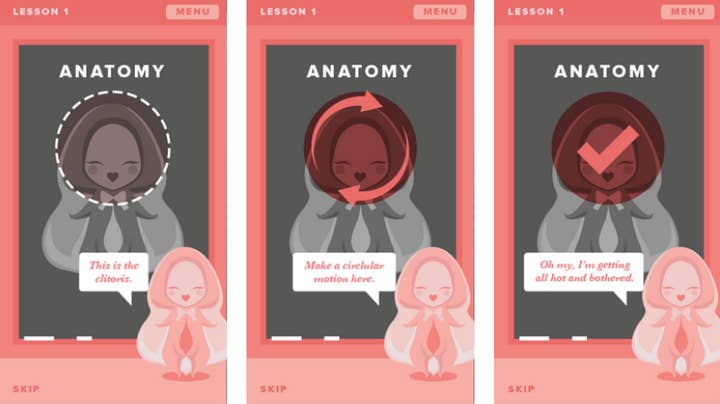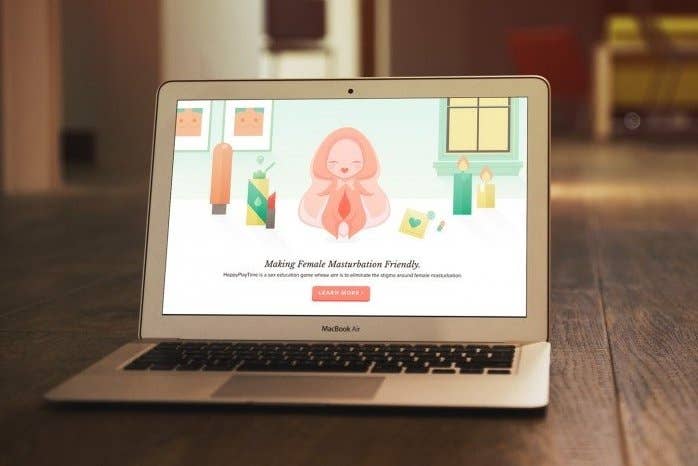The vagina that scared Apple
Why HappyPlayTime, an app designed to fight a stigma, won't be on iTunes
A friendly cartoon vulva called Happy has the dubious honour of being the latest app Apple has rejected from its App Store, joining the ranks of Littleloud's Sweatshop and Auroch Digital's Endgame: Syria. As the star of HappyPlayTime, gamers touch her as instructed to make her happy, learning about how to please their own bodies in the process. Think educational and empowering, rather than Redtube.
"I admit, it's pretty far out there. You're using your touch screen to play with a vulva character to make her orgasm," says creator Tina Gong, who is currently battling to get the game accepted by Apple.
"It's something that has a huge potential of making certain groups angry. As a large company, I'm sure that they're trying to stay away from controversy. I get it, but it still makes me sad."
HappyPlayTime lists its objectives as "eliminate stigma, encourage exploration and make you giggle," and you can see a quick slide show pitch for the project here.
Apple rejected the app, and Gong appealed, raising the age rating to 17+. The app was then rejected a second time on two violations of its rules, namely "apps that present excessively objectionable content" and "apps containing pornographic material." One look at Happy's smiling cartoon face and you can't help wondering just what type of porn those Apple assessors must be into.
"I have a feeling that if I changed the way this game was designed, taking out the central core of it being an app where you can literally play with the character, invest emotionally in her well-being, it would get through. They mentioned that the 'concept' was objectionable. My feeling is that they don't mean female masturbation, but just this gaming aspect."

"When you think about the sensation of touch, it's a naturally intimate medium. There is so much that went into the design, including the character, her personality, her phrases, the game mechanics (all which fall under this broad idea of 'concept' that Apple calls it), that I believe makes the experience innovative."
It's important to understand that this app really isn't weird and pervy. At all. It's aimed at women, and comes complete with information to educate users about female masturbation and to remove the stigma surrounding the topic. Male masturbation is accepted, joked about on supper time television and normalised. Female masturbation is still mainly consigned to edgy stand up routines and porn, and neither of those mediums are exactly instructional.
"The idea is to make users fall in love with this character, who is meant to represent some archetype of all vulvas everywhere," says Gong, before joking that she realises that sounds "ridiculous" written down.
"I'm sure that they're trying to stay away from controversy. I get it, but it still makes me sad"
"You'll be naturally motivated to play this game to make [the character] happy, and in the process, you can maybe learn more about appreciating your own body, and apply the same love and care-taking to yourself as you do to her. The novelty of this concept is what got the mission out there, that created awareness about the issues - it serves its purpose. If it had been any different, I doubt many people would have been riled up about it."
Perhaps Apple can't be blamed for being careful, but then maybe it should be more careful about what does make it through. Why are guides to sexual positions OK, but this isn't? Why are apps with a distinctly "creepy uncle" vibe the first thing you find when you search for sex on the App Store? For instance, at the moment you can download Rack Stare, a game that involves staring at women's breasts without them noticing. Gong says she's not opposed to those sort of apps, but what's important is that a "variety of voices" are on offer for consumers, one perspective.

"I don't have a problem with apps like Rack Stare, they're out there, and they're there to serve a certain group of people, and more power to them," she explains.
"But there aren't a lot of things that provide an alternative to this kind of content. There are very few authentic female voices creating. And when there aren't that many, you start to think that this is what sex and sexuality is, when it's not the case. And that creates a vicious cycle in culture - you're constantly trying to achieve normalcy by adhering to the standards that Rack Stare sets for you, and you perpetuate that culture."
Gong now wishes she had built HappyPlayTime as a web based game from the start, with the option to then port it to mobile platforms. She's also hopeful that Android's slightly looser policies might allow a HappyPlayTime release, though she's heard that they've recently become stricter.
What she won't do is change the game, not for Apple, not when the mechanics are key to the message.
"Apple might have understood the purpose of it being educational, but wants to force me to strip out all the things that make this game what it is"
"I'm always looking for ways to break traditional models of doing things, so I guess that makes me stubborn about keeping this game system in place. I don't want to create a website or article, because so many great resources exist like that already. I'd rather work with those experts to create a new way of digesting the information. Apps like this create more receptivity, and make the educational aspect more inviting, welcoming."
"My guess is that Apple might have understood the purpose of it being educational, and that it was built with a mission, but wants to force me to strip out all the things that make this game what it is. And I can't accept that."
For the moment, the browser version is still in testing and Gong hasn't given up on the iOS version.
"I'm currently trying to get a meeting or a phone call with the executive that runs the entire App Store, and see if I can make a case. If that fails, I'm not sure what else I can do. I've already reached out to my networks, but if anybody can make an intro, or wants to tweet @mattfischer415 to help our case, I would sincerely appreciate it."
It might feel like a lot to ask from an industry, one that has struggled to represent any sort of positive sexuality in its games, to suddenly start celebrating female sexual curiosity in a positive and nurturing way. To have girls learning about their own bodies and what they can do through a game, rather than just wondering why that elf has boobs big enough to suffocate a Murloc. It's a long shot, but it's one Gong is taking, and one that the industry should support in any way it can.

